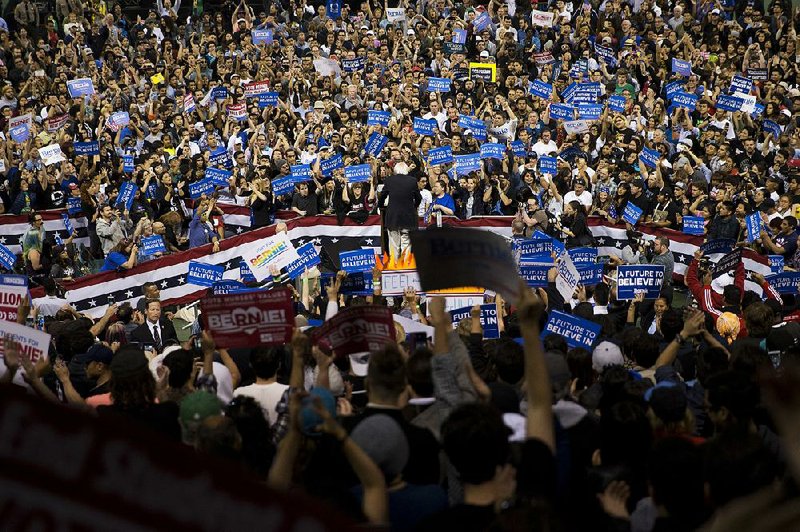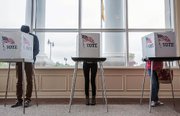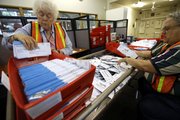WASHINGTON -- Kentucky's Democratic presidential primary remained too close to call Tuesday night, with one-half of 1 percentage point separating Hillary Clinton and Bernie Sanders.
RELATED ARTICLE
http://www.arkansas…">Kochs put cash in Senate races
FULL ELECTION COVERAGE
Claiming the edge, Clinton declared victory on Twitter, posting: "We just won Kentucky! Thanks to everyone who turned out. We're always stronger united." With almost all of the votes counted, the former secretary of state held a lead of fewer than 2,000 votes.
Sanders, a senator from Vermont, won in Oregon. The state in the Pacific northwest also had the night's sole GOP contest, in which Donald Trump snagged an easy victory as the only candidate still actively campaigning for delegates.
Clinton entered Tuesday's primaries in Kentucky and Oregon with a lead of nearly 300 pledged delegates over Sanders and a dominant advantage among party leaders and elected officials known as superdelegates. But both campaigns said Sanders had an edge in Oregon.
Tuesday's Democratic contests awarded delegates proportionally, meaning both Sanders and Clinton were set up to add to their delegate total.
For Democrats, 55 delegates were up for grabs in Kentucky and 61 delegates were at stake in Oregon.
In Kentucky, the former secretary of state visited black churches and a small-town diner and held rallies Sunday and Monday in an effort to break Sanders' momentum after his recent victories in Indiana and West Virginia.
Clinton's husband, former President Bill Clinton, was the last Democrat to carry the state in a presidential election -- he won Kentucky in 1992 and 1996 -- and the former first lady tried to emphasize those ties in the days leading up to the primary.
"I'm excited about the primary, but we've got to turn a lot of people out," Hillary Clinton said at a packed diner in Paducah, Ky., on Monday. "I'll tell you this: I'm not going to give up on Kentucky in November. I want to help to bring back the kind of economy that worked for everybody in the 1990s."
Facing a choice between Clinton and Sanders, physician Annie Skaggs in Campbellsville, Ky., said she had a hard time making up her mind.
"I like them both. I wanted to put them both in a blender and whir them up together," she said. "I voted for Hillary. She's got a little broader base and more experience, especially with foreign policy."
Sharon Sharp said she voted for Sanders for one reason: He is not Hillary Clinton.
"Benghazi and the emails? That's just too much to trust her to run my country," Sharp said after casting her vote.
In Oregon, which is among the nation's most liberal states, Sanders had been putting in appearances in the state. He also secured the endorsement of Sen. Jeff Merkley, D-Ore., in April.
Both primaries Tuesday were open only to registered Democrats, which has been an advantage to Clinton in the past.
Nearing the end of a long primary slog, the two Democratic candidates are preparing for June 7 primaries in California, New Jersey and four other states. When pledged delegates and superdelegates are combined, Clinton entered Tuesday with 2,240, about 143 short of the the 2,383 needed to secure the Democratic nomination. Sanders had 1,473 total delegates, putting him 910 short.
Sanders has vowed to campaign through the end of the primary season, on June 14 in the District of Columbia, and to amass as many delegates as possible to influence the party's platform and message. He would need to win about two-thirds of the remaining pledged delegates to end the primary season in a tie.
"Before we will have the opportunity to defeat Donald Trump, we're going to have to defeat Secretary Clinton," Sanders said at a rally Tuesday night in Carson, Calif.
Trump had 1,143 delegates heading into the Oregon contest -- 94 delegates short of the 1,237 he needs to clinch the nomination.The New York businessman had picked up nine delegates earlier Tuesday in Guam, which held its territorial convention in March.
While Oregon's vote was little more than a formality, the state has a proportional primary, meaning Trump's win was unlikely to net a sweep of the state's 28 delegates.
Nevada aftermath
Tuesday's elections took place as new questions about Democrats' party unity arose after a divisive weekend state party convention in Nevada. Supporters of Sanders tossed chairs and made death threats against the Nevada party chairman at the event in Las Vegas, arguing the party leadership rigged the results of the convention in favor of Clinton.
The Nevada Democratic Party filed a formal complaint Monday against the Sanders campaign. In the letter to the national party, it went so far as to accuse the Sanders campaign of fomenting violence.
The state party's letter says a small number of Sanders supporters, angry at a vote rejecting proposed changes to the rules of the day, protested loudly throughout the day. That anger was heightened by the fact that, despite Sanders' team having managed to get more people elected to attend the event, more delegates for Clinton showed up Saturday. Nearly 60 Sanders delegates were rejected for not being registered Democrats by the May 1 deadline.
Sanders issued a statement Tuesday dismissing complaints from Nevada Democrats as "nonsense" and said his supporters were not being treated with "fairness and respect."
"If the Democratic Party is to be successful in November, it is imperative that all state parties treat our campaign supporters with fairness and the respect that they have earned," Sanders said. "I am happy to say that has been the case at state conventions in Maine, Alaska, Colorado and Hawaii where good discussions were held and democratic decisions were reached. Unfortunately, that was not the case at the Nevada convention."
Sanders cast the episode as the latest evidence of the national party trying to silence the grass-roots.
"The Democratic Party has a choice," Sanders said. "It can open its doors and welcome into the party people who are prepared to fight for real economic and social change. ... Or the party can choose to maintain its status quo structure, remain dependent on big-money campaign contributions and be a party with limited participation and limited energy."
On Tuesday afternoon, Democratic National Committee Chairman Debbie Wasserman Schultz released a statement about the letter, noting the party was "deeply concerned" about "troubling details."
Trump scouts turf
Already looking beyond the GOP's convention affirming its nomination, Trump has rushed to install operatives in several states that traditionally favor Democrats.
The staffing expansion includes Maine, Minnesota and other places where Trump opens as the underdog, seeking to expand the electoral battlefield by drawing on his appeal among working-class white voters -- and his eventual Democratic opponent's perceived weakness with them.
"I will win states that no Republican would even run in," Trump said in a recent interview.
The Trump campaign has identified roughly 15 states where it plans to install state directors by the end of the month. They include traditional battlegrounds such as Ohio, Florida and Virginia and more challenging terrain such as Minnesota, Michigan, Wisconsin, Pennsylvania and Maine -- places Republican candidates have lost for the past six presidential elections or longer. Target states also will likely include Republican-leaning Georgia, where demographic shifts have benefited Democrats.
Trump's deployment of political operatives was outlined by campaign strategists who weren't authorized to speak publicly about internal strategy and demanded anonymity. The plan will be subsidized, at least in part, by the Republican Party's new "building fund," a lightly regulated pool of money that can include donations of more than $100,000 from individual donors, they said, though rules for doing so might pose an obstacle.
Trump's team aims to have about 15 state directors on the payroll by June 1, supplementing more than 200 committee operatives nationwide. Communications, events and "coalitions" chiefs will augment the campaign's presence.
To help fund the expansion, Trump's strategists said he'll draw from a fundraising deal signed Tuesday night with the Republican National Committee, allowing donors to write checks of up to $449,400 that the national party can spend on both his campaign and other Republican efforts.
The agreement establishes two committees: The Trump Make America Great Again Committee, between the RNC and the Trump campaign, and Trump Victory, which includes the campaign, the RNC and a list of state GOP parties, including Arkansas.
RNC Chairman Reince Priebus said in a statement that money will go toward expanding ground, data and digital operations to elect Republicans "up and down the ballot."
Clinton has a similar agreement with Democrats, enabling her to collect checks of more than $350,000 from individual donors.
Financial filings
Late Tuesday, Trump filed new financial documents describing his personal wealth, announcing that he had submitted his candidate financial disclosure form to the Federal Election Commission.
He said it showed "a tremendous cash flow" and growing revenue from his businesses.
The form -- which will be publicly available after an initial review by the government -- should offer updated information about the value of his assets and the revenue produced by his businesses. According to Trump, over the past 17 months his businesses' revenue grew by $190 million, and he earned $557 million in income.
Trump said last July in a note accompanying a previous disclosure that he was worth more than $10 billion, an assertion he also made Tuesday. Also last year, he reported that a large amount of his valuation came from the $3.3 billion in estimated worth he placed on his personal brand. Last July, Forbes magazine deflated that valuation, saying Trump's brand was likely worth about $125 million.
In Tuesday's release, Trump also said his ability to accumulate wealth demonstrates what he described as "the kind of thinking the country needs."
The businessman's finances have come into question over his refusal to release his tax returns pending a federal audit. Trump told Good Morning America on Friday that he doesn't believe that voters have a right to see his tax returns.
Clinton also filed financial documents Tuesday, showing that in 2015 she earned more than $5 million in royalties from her book Hard Choices and about $1.5 million in speaking fees before she launched her presidential campaign.
Her candidate financial disclosure form shows that most of her personal wealth is held in a Vanguard 500 Index Fund and a separate JP Morgan Custody Account, both valued at $5 million to $25 million. The form also shows that her husband earned more than $5 million in speaking fees in 2015.
Separately, Trump said in an interview that he's open to speaking with North Korean leader Kim Jong Un to try to halt the communist nation's nuclear program.
"I would speak to him. I would have no problem speaking to him," Trump told Reuters on Tuesday.
No sitting U.S. president has met with the leader of North Korea, although former U.S. presidents have met with Kim Jong Un's predecessors on visits to the isolated nation. Jimmy Carter met in 1994 with Kim Il Sung, the current leader's grandfather. Bill Clinton met with Kim Jong Il, the current leader's father, in 2009 when he traveled to Pyongyang to secure the release of two detained American journalists.
Information for this article was contributed by Ken Thomas, Nicholas Riccardi, Catherine Lucey, Michelle Rindels, Steve Peoples, Julie Bykowicz, Jill Colvin, Julie Pace, Jeff Horwitz, Chad Day, Matthew Pennington of The Associated Press; by Ben Brody of Bloomberg News; and by Philip Bump of The Washington Post.
A Section on 05/18/2016


